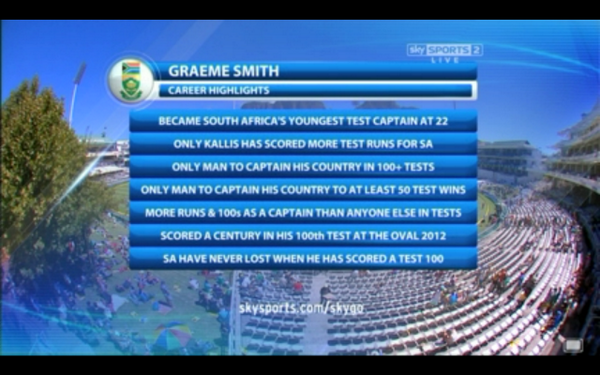Historic day for South Africa as Hashim Amla is named national Test cricket captain in Johannesburg and becomes the first non-white player to hold the highest office in the sport.
The Durban-born batting maestro’s elevation should not be hailed as racial transformation working in South African sport nor, will it ease political agendas from the Department of Sport and Recreation.
Lets get one thing clear about Amla’s appointment as Test captain: this is not a gesture of “tokenism” in a country divided by political reform and interference.
This is deserved reward for years of success and his quality as an “elder statesman” within the team.
He is one of South Africa’s greatest cricketers; a batsman of the highest order and an impecable role-model as well as one of the calmest, coolest players around.
Amla has led before; the SA Under-19 team, the Dolphins and stood in for the injured AB de Villiers for two Twenty20 internationals and three one-day internationals against Australia, so he is no novice.
The general consensus is that De Villiers would be a more suitable captain, continuing with the Proteas’ style and philosophy instilled under former Test captain, Graeme Smith.
Smith led from the front, was the voice of the team, its backbone. He could be brash and never took a backwards step; a leader of men.
The 31-year-old is quiet, unassuming, calm and prefers to be in the background and will add something different to the side.
“It will be difficult for me to comment on what kind of captain I will be. Let the series come up and naturally my style and what I can bring to the party will come out anyway,” he said.
Cricket South Africa were concerned about handing De Villiers dual captaincy responsibilities of both Test and one-day international cricket.
The timing of the captaincy announcement and the decision to appoint the Amla implies that the original thinking was for the wicket-keeper to take the reigns.
However, the up coming World Cup and the workload of having to keep wicket as well as being considered a front line batsman, seems to have been a pivotal reason for the split captaincy.
Convener of the national selection committee, Andrew Hudson confirmed this by pointing out that the primary concern over the next year is the 2015 World Cup in Australia and New Zealand.
”We have a very skewed season ahead of us with 30 ODIs, including the World Cup. So this next season, the focus is on one-day cricket.”
Hudson offered the reason behind the decision as being a balancing act between Amla and De Villiers and their roles in both formats of the game.
“What AB has achieved with Russell [Domingo] in the one-day side and the gelling of that team going forward is something we did not want to disrupt.
“Hashim will compliment AB in terms of his style and what he wants to do with the one-day side, just as AB will complement Hash in the Test arena.
“AB will continue to keep wicket in Tests and that also gives us nice options,” he said.
Read what you will into those comments but it is clear this decision wasn’t straight forward and that Amla needed some persuading despite revealing that he had harboured thoughts on the captaincy after Smith retired.
“When Graeme retired, it came as a surprise to us, especially with him being a young person but we could also understand because of the pressures of being a captain for so long,” Amla said.
“At that moment, I felt with the group of senior guys we have in the team – myself, AB, Dale [Steyn], JP [Duminy], Morne [Morkel], and Faf [Du Plessis] – that if the team wanted, I would be available,” he added.
There it is. Issues over the two Test batting positions vacated by Smith and Jaques Kallis and the feeling that Quinton de Kock is not ready for Test cricket, the makeup of the Test team has dictated that Amla preside over the transition.
With a core of senior players, Amla understands that he will need time to settle into his new role.
“It took the previous team a few years before we found a winning combination – we hope it won’t take as long. But there will be some teething issues early on.
“We’ve got a senior group of guys, all exceptional cricketers and hopefully we’ll get to that point a lot quicker than before.”

